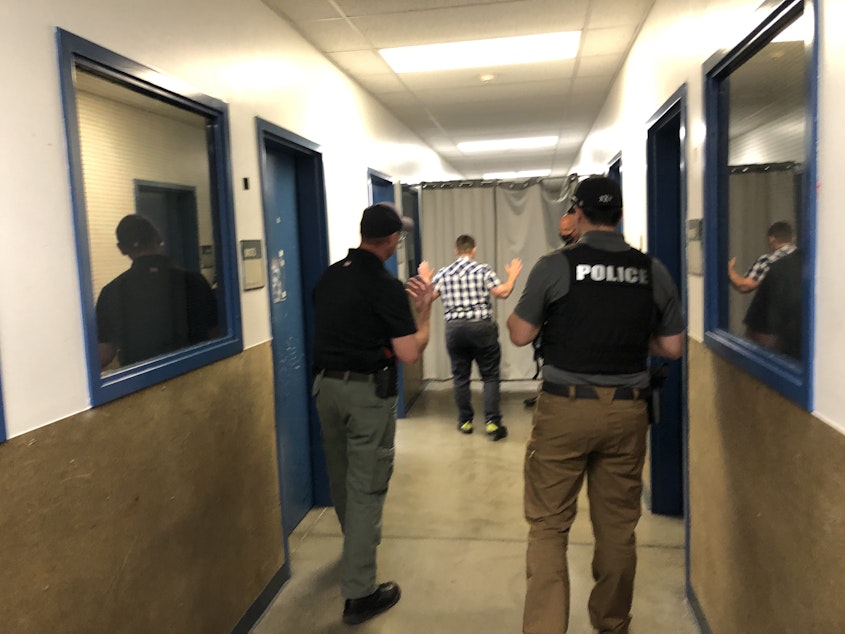New reforms cause 'confusion and uncertainty,' WA police say. Advocates say the laws just need time

Several new police reform laws took effect in Washington last week, requiring de-escalation by police and restricting their use of force.
The new laws are proving to be controversial among law enforcement agencies, with police chiefs pointing to confusion over how they should be implemented. But supporters say the new laws reflect the public will, and should be given time to work.
The state’s new "use of force" law raises the bar for when police can detain someone who is running away. Within days of the law taking effect, the Pierce County Sheriff’s office said those new restrictions prevented deputies from pursuing a murder suspect in Puyallup.
Republican legislators from Puyallup in the 25th Legislative District have called for a special session to reexamine those laws.
“We implore the governor to call a special session so the Legislature can address this issue and pass new reforms that will allow law enforcement to quickly and effectively stop criminals and keep Washingtonians safe,” Rep. Kelly Chambers, Rep. Cyndy Jacobsen, and Sen. Chris Gildon said in a joint statement. “At the same time, we must also provide clarity to law enforcement so the law is uniformly understood and equitably applied statewide."
Democratic Representative Roger Goodman chairs the House Public Safety Committee. He supports the laws and said he doesn’t believe they are hindering law enforcement, despite some agencies’ concerns.
“I have to say most of the police agencies that I’ve heard from, including in my own district on the East side of Seattle, they’re not adjusting their practices at all — they already comply with best practices,” he said.
Sponsored
Goodman added that he thinks the goals of the legislation are sound. “If there’s any ambiguity in the law that we passed, so we need to make it clear, we would certainly amend the law,” he said. “As to the policy changes however, we believe we’ve done the right thing to reduce needless use of force and needless injuries and deaths.”
Even before the new laws took effect on July 25, many police chiefs across the state warned that their communities could see changes in how police respond to crisis calls and other emergencies. Everett Police Chief Dan Templeman said he is not anti-change, but suggested residents might need to reset their expectations.
“I do believe officers will be using less force, in the long run,” he said. “Now how [the new laws impact] community safety in the end — that remains to be seen.”
Templeman said he strives to be a progressive and innovative chief. His agency already emphasizes de-escalation and mirrors some requirements of the new laws. But he said agencies are scrambling to understand and comply with the new mandates. The Washington Attorney General is required to develop guidance for them, but that isn’t due for another year.
“Ideally we would have had the Attorney General’s model policy in hand prior to all the police departments in the state trying to figure it out on their own," Templeman said. "And that is something that if I could change or influence, that would be the number one thing right there.”
Sponsored
Without that assistance, Templeman said, law enforcement agencies are asking their legal departments what they need to do.
“What you’re finding statewide is confusion and uncertainty and disagreement amongst lawyers, very experienced legal advisors, and attorneys statewide, and I think that’s a problem,” he said.
Enoka Herat, the police practices counsel with the ACLU of Washington, said the new laws are a meaningful response to last summer’s protests over the police killing of George Floyd in Minneapolis, and she thinks they’re working.
“I think we’re already seeing some of the successes that the law intended, of law enforcement choosing not to use force when engaging with members of the public, and trying to have a higher standard of evidence before they do put their hands on someone,” she said.
Herat said supporters of the laws aren’t surprised by what she called “pushback from law enforcement.” The Washington State Patrol said last week that one of the new laws prevented troopers from chasing someone who drove the wrong way on I-5 and struck another car head-on before fleeing.
Sponsored
Herat said the new law does allow officers to pursue people if they have reasonable suspicion the drivers are impaired. She said, “So how driving the wrong direction down a road would not constitute ‘reasonable suspicion’ is baffling to me.”
Washington State Patrol spokesperson Rocky Oliphant said the agency is currently being extremely cautious about undertaking DUI pursuits — they’re only happening after a sergeant’s authorization. Oliphant said in an email, “If we do have a pursuit and it’s later determined we did not have reasonable suspicion then we are in violation of the law.”
Meanwhile, Templeman, Chief of the Everett Police Department, said the stakes are now higher for police officers if they get it wrong.
“That officer faces the potential of decertification by the state Criminal Justice Training Commission, and if that occurs...that means the officer loses his or her license to practice law enforcement in the state of Washington — they no longer can be a police officer,” he said.
Templeman said he supported expanding the decertification process, which had previously been cumbersome and rarely used. But those changes increase the pressure on agencies to make sure they understand the new laws correctly.




